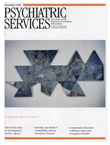Mortality and medical comorbidity among psychiatric patients: a review
Abstract
OBJECTIVES: To fuel advocacy for improved health care for mentally ill persons, the authors reviewed the literature that describes excess mortality and underrecognition and undertreatment of comorbid medical conditions in this population. Barriers to optimal primary medical care for psychiatric patients are discussed. METHODS: A MEDLINE search focusing on mortality and medical problems in psychiatric patients yielded 66 papers in English published between 1934 and 1996. These studies and a German paper from 1912 are included in the review. RESULTS AND CONCLUSIONS: Standardized mortality ratios for psychiatric patients, derived from comparisons with the general population and matched control groups, have repeatedly demonstrated excess mortality from both natural and unnatural causes among psychiatric patients. Several large studies that have attempted to clarify the issues underlying increased death rates are discussed. Although no single diagnostic group emerges as being at particularly high risk, substance abuse disorders alone or in combination with other psychiatric disorders have been repeatedly found to lead to increased mortality rates. Other studies have also repeatedly demonstrated that psychiatric patients suffer a high rate of comorbid medical illnesses, which are largely undiagnosed and untreated and which may cause or exacerbate psychiatric symptoms. Atypical presentations are common, and changes in vision are the symptoms most predictive of medical illness. Elderly patients and those with diagnoses of organic brain syndromes are at highest risk for comorbid medical illness. Parity in the medical and mental health treatment of psychiatric patients requires both political advocacy and development of primary care programs capable of efficiently meeting their needs.
Access content
To read the fulltext, please use one of the options below to sign in or purchase access.- Personal login
- Institutional Login
- Sign in via OpenAthens
- Register for access
-
Please login/register if you wish to pair your device and check access availability.
Not a subscriber?
PsychiatryOnline subscription options offer access to the DSM-5 library, books, journals, CME, and patient resources. This all-in-one virtual library provides psychiatrists and mental health professionals with key resources for diagnosis, treatment, research, and professional development.
Need more help? PsychiatryOnline Customer Service may be reached by emailing [email protected] or by calling 800-368-5777 (in the U.S.) or 703-907-7322 (outside the U.S.).



